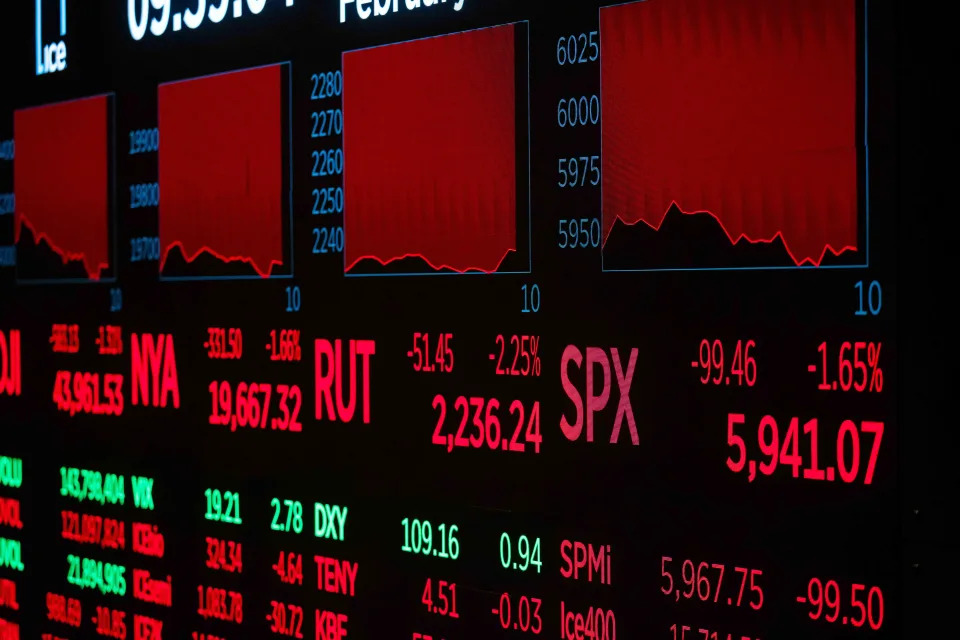
Key Takeaways
Stocks fell on Monday as markets reacted to President Trump’s decision to impose tariffs on America’s three largest trading partners, sparking concerns a trade war could hit consumer and corporate finances.
Trump over the weekend ordered the imposition of a 25% tariff on Canadian and Mexican imports and a 10% levy on Chinese goods. Canadian oil and energy imports won a carve-out and will be subject to a lower 10% import tax.
On Monday morning, Trump announced the Mexican tariffs would be
delayed by one month
after Mexican President Claudia Sheinbaum agreed to deploy the military to the U.S.-Mexico border. Canadian and Chinese tariffs are scheduled to go into effect just after midnight on Tuesday morning.
U.S. stocks stocks came off their earlier lows after the delay of tariffs on Mexican products but remained firmly in negative territory in recent trading.
Tariffs Could Be 5% Blow to S&P 500, Says Goldman
Goldman Sachs analysts modeled out how the tariffs could impact U.S. markets, and estimated the levies may reduce the S&P 500’s fair value by roughly 5%.
Tariffs, they explained, will either shrink U.S. profit margins by raising input costs or, if higher costs are passed on to consumers, slow sales. “We estimate that every 5pp increase in the US tariff rate would reduce S&P 500 EPS by roughly 1-2%. As a result, if sustained, the tariffs announced this weekend would reduce our S&P 500 EPS forecasts by roughly 2-3%,” the analysts wrote in a note released Sunday.
In addition, tariffs are expected to support U.S. dollar strength . International sales account for about 28% of the S&P 500’s revenue, and a stronger dollar eats into the value of those sales. Though, the analysts note, the dollar's impact on earnings may be limited given Canada and Mexico account for less than 2% of the S&P 500’s sales.
The tariffs have amplified economic and political uncertainty, threatening to undercut Wall Street’s appetite for risk. According to Goldman, the U.S. Economic Policy Uncertainty Index on Friday jumped to 502, its highest level since March 2020. Historically, this level of uncertainty has translated to a 3% reduction in the S&P 500’s forward P/E ratio .
Since tariffs could both stoke inflation and weigh on economic growth, their impact on
Treasury yields
, especially on the long-term bonds that have the biggest effect on stocks, is expected to be minimal.
'Some Probability' of Stock Correction, Says Former JPM Strategy Chief
Other analysts have forecast more dramatic consequences for stocks. Bank of America analysts on Monday estimated that a trade war between the U.S. and its largest trading partners could translate into an 8% hit to the S&P 500’s aggregate earnings.
Marko Kolanovic, former head of equity strategy at JPMorgan, said political turmoil is just one of the risks that could sink stocks. The index is due for a pullback into the 5,000s this year, he said on an episode of Bloomberg’s Odd Lots podcast recorded last week before Trump’s tariffs were announced. The index, he warned, could even retreat more than 1,000 points from its current level, which would put the index in a correction . "I think there's some probability of that," he said.
Kolanovic on Sunday addressed Trump’s tariffs and the impact they could have on the market. “Trade war puts us in 2018 environment (higher volatility, lower valuations). Those who point (out) that Trump cares about stock market, should remember that even then he did not react until ~5% decline. Tolerance for declines could be higher now, and markets are at highs,” he wrote in a post to X.
Read the original article on Investopedia

